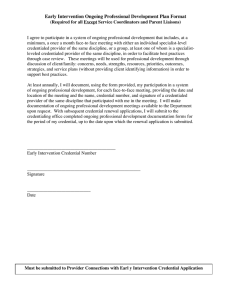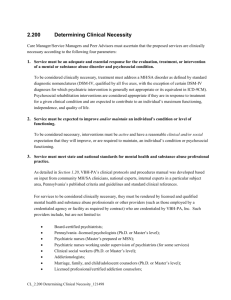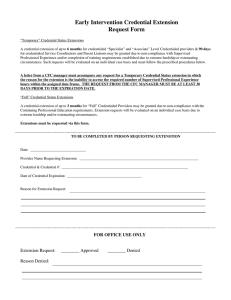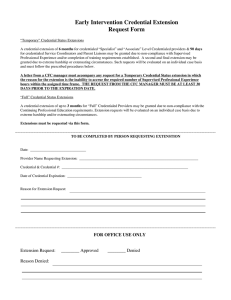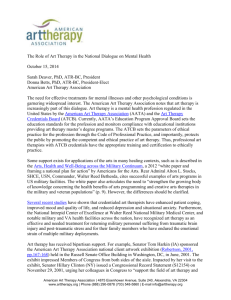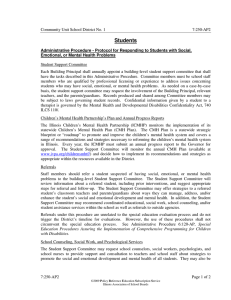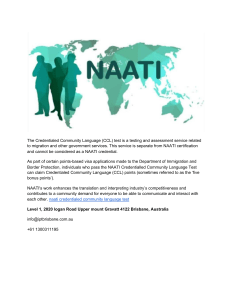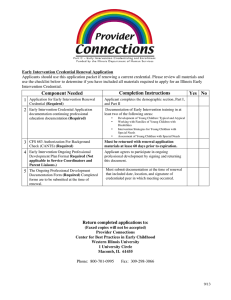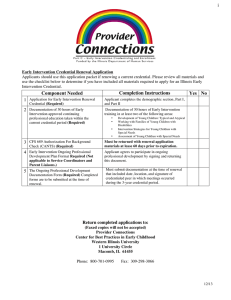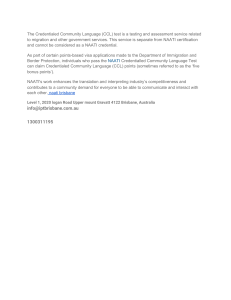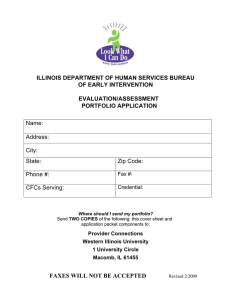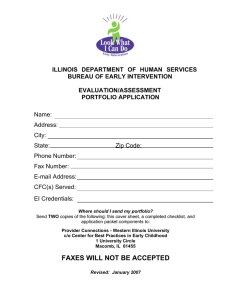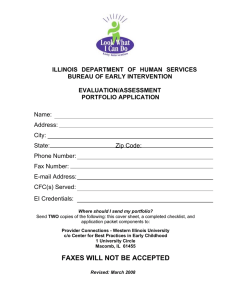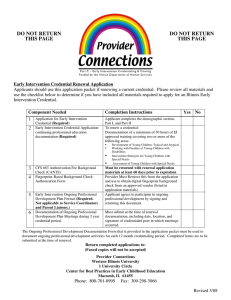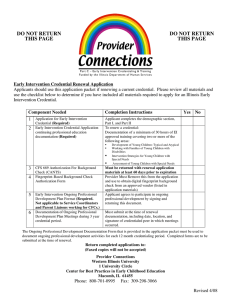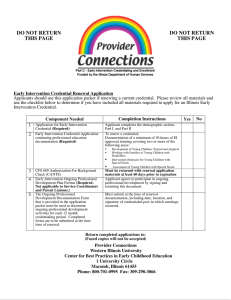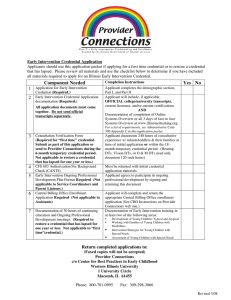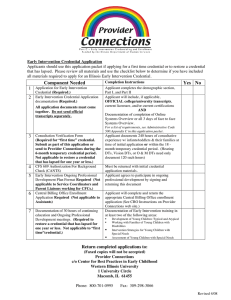Ongoing Professional Development June 2003
advertisement
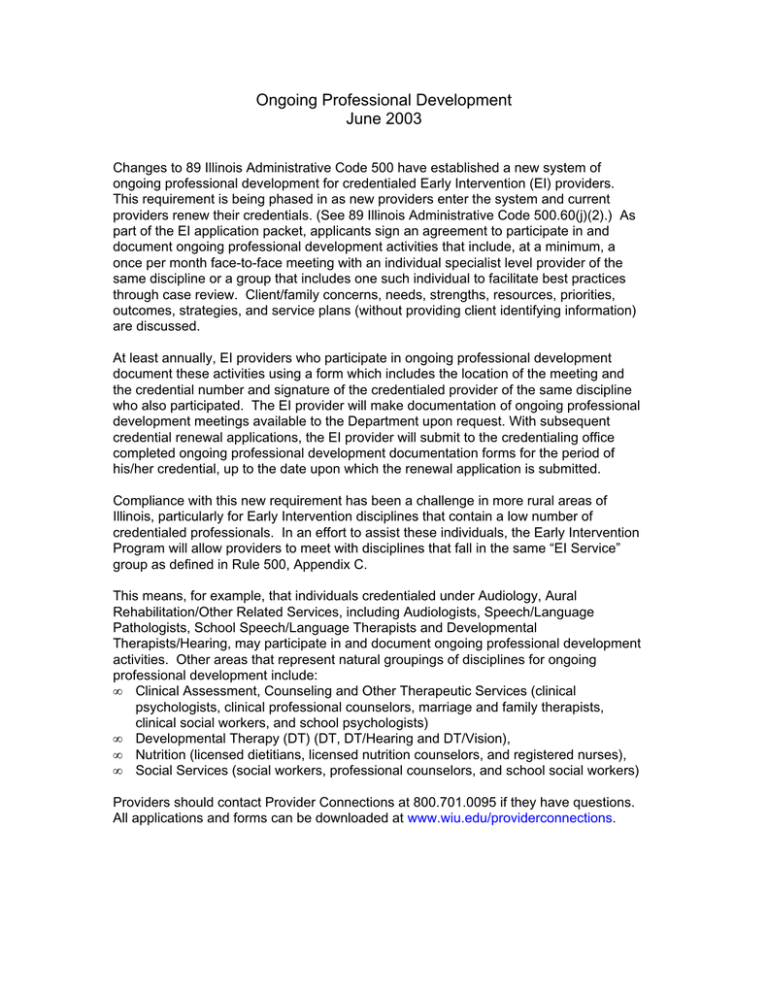
Ongoing Professional Development June 2003 Changes to 89 Illinois Administrative Code 500 have established a new system of ongoing professional development for credentialed Early Intervention (EI) providers. This requirement is being phased in as new providers enter the system and current providers renew their credentials. (See 89 Illinois Administrative Code 500.60(j)(2).) As part of the EI application packet, applicants sign an agreement to participate in and document ongoing professional development activities that include, at a minimum, a once per month face-to-face meeting with an individual specialist level provider of the same discipline or a group that includes one such individual to facilitate best practices through case review. Client/family concerns, needs, strengths, resources, priorities, outcomes, strategies, and service plans (without providing client identifying information) are discussed. At least annually, EI providers who participate in ongoing professional development document these activities using a form which includes the location of the meeting and the credential number and signature of the credentialed provider of the same discipline who also participated. The EI provider will make documentation of ongoing professional development meetings available to the Department upon request. With subsequent credential renewal applications, the EI provider will submit to the credentialing office completed ongoing professional development documentation forms for the period of his/her credential, up to the date upon which the renewal application is submitted. Compliance with this new requirement has been a challenge in more rural areas of Illinois, particularly for Early Intervention disciplines that contain a low number of credentialed professionals. In an effort to assist these individuals, the Early Intervention Program will allow providers to meet with disciplines that fall in the same “EI Service” group as defined in Rule 500, Appendix C. This means, for example, that individuals credentialed under Audiology, Aural Rehabilitation/Other Related Services, including Audiologists, Speech/Language Pathologists, School Speech/Language Therapists and Developmental Therapists/Hearing, may participate in and document ongoing professional development activities. Other areas that represent natural groupings of disciplines for ongoing professional development include: • Clinical Assessment, Counseling and Other Therapeutic Services (clinical psychologists, clinical professional counselors, marriage and family therapists, clinical social workers, and school psychologists) • Developmental Therapy (DT) (DT, DT/Hearing and DT/Vision), • Nutrition (licensed dietitians, licensed nutrition counselors, and registered nurses), • Social Services (social workers, professional counselors, and school social workers) Providers should contact Provider Connections at 800.701.0095 if they have questions. All applications and forms can be downloaded at www.wiu.edu/providerconnections. Ongoing Professional Development • • • • Regularly scheduled Protected time Only topic is client cases Brainstorming is key Advantages of Ongoing Professional Development • • • • • • • Generates creative ideas to complex problems for which there is no “right” answer. Shares the burden of difficult situations. Supports and affirms colleagues. Reinforces client and EI provider achievement. Provided insights into cultural dimension of cases. Builds a sense of fun. Helps EI provider cope with stress. Challenges to Ongoing Professional Development • • • • • Some personalities may dominate. Venting can lead to a negative culture that is a waste of time. Formal sessions may inhibit creativity. The process takes time. All cases cannot be reviewed. Ongoing Professional Development Group Discussion • • • • • • • • • EI providers volunteer case situations where they are not sure what to try next. Questions of clarification are asked. The group brainstorms ideas. Only the EI provider presenting the case situation can evaluate the fit of an idea with the case. Acceptable ideas must be so specific that everyone knows how it can be done. The group must generate ideas until the EI provider has three specific next steps. The group should focus on what the family says they need to safely care for the child. Always explore natural helpers and community resources. Everyone should laugh during the session.
